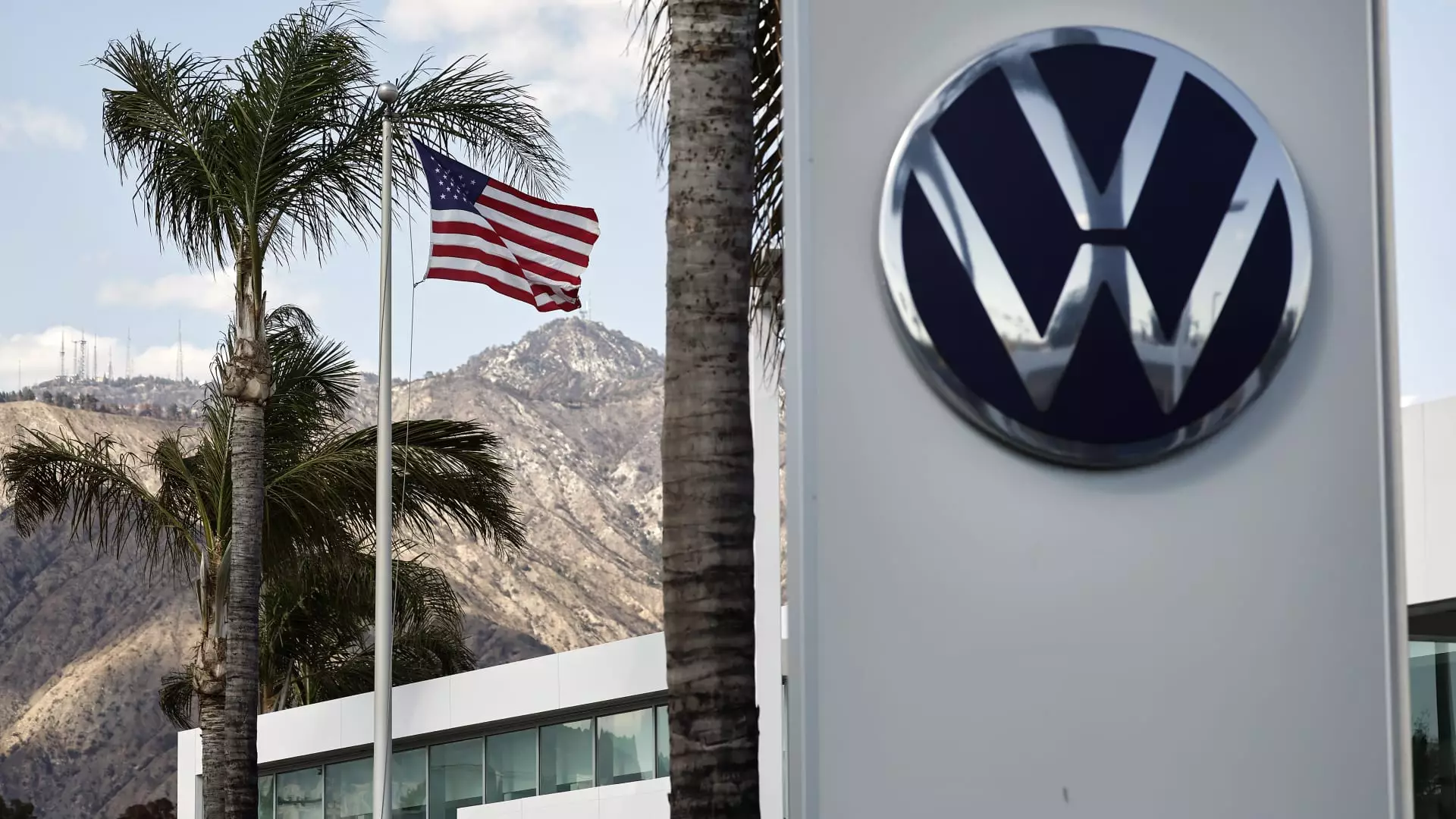Volkswagen, Germany’s automotive powerhouse, recently revealed an unsettling 37% plunge in its operating profit for the first quarter of the year, falling to 2.9 billion euros ($3.3 billion). While this news should send shivers down the spine of stakeholders, it also raises pressing questions about the company’s resiliency and strategic direction amid a chaotic global economic landscape. If this first quarter is any indication, Volkswagen could be teetering on the edge as it navigates a labyrinth of tariffs, economic uncertainty, and shifting consumer preferences.
The automotive industry is notorious for its volatility, but the unique circumstances surrounding Volkswagen add an additional layer of complexity to the equation. U.S. tariffs are wreaking havoc across the sector, and it appears that the company is only beginning to grasp the full extent of their repercussions. The fact that Volkswagen’s profit report not only fell short of earlier forecasts but also demonstrated a significant departure from analyst expectations, as a forecast of around 4 billion euros failed to materialize, illustrates a broader trend of unpredictability within the global market.
A Mixed Bag of Performance Indicators
Despite the staggering drop in profit, Volkswagen reported a moderate increase in first-quarter sales revenue, which rose 2.8% to 77.6 billion euros. Other performance metrics tell a somewhat convoluted story. Sales outside of China rose, reflecting a strategic pivot that could be a double-edged sword. While 2.1 million vehicles sold globally is a respectable number—0.9% up from last year—shouldn’t this success be overshadowed by the alarm bells ringing from profitability concerns? The gain suggests that Volkswagen’s market adaptability is still functioning, but what good is expanding market share if profitability continues to dwindle?
Moreover, the staggering 29% spike in vehicle order intakes in Western Europe highlights a growing demand that Volkswagen must capitalize on effectively. Yet, with net cash flow reported at -0.8 billion euros, questions arise about the long-term sustainability of this momentum. How long can a company rely on demand surges while grappling with ballooning operational costs?
The Balancing Act of Cost Reduction
CFO Arno Antlitz struck a note of cautious optimism, asserting the importance of focusing on levers within the company’s control. This sentiment echoes a familiar refrain in corporate speak, but the reliance on cost reduction as a strategy raises eyebrows. Volkswagen’s rich legacy of engineering excellence and innovation mustn’t be compromised for short-term profitability gains. Cutting costs can be a slippery slope that sacrifices long-term vision in favor of immediate financial relief, leading to a drawn-out struggle to maintain competitive products in the marketplace.
This philosophy invokes a pressing need for innovative thinking, especially as companies are increasingly challenged to reduce emissions and transition to electric vehicles. Can Volkswagen truly navigate these waters efficiently while considering stakeholders’ environments and long-term profitability? It’s a tightrope act that requires both finesse and foresight.
Political Headwinds and Global Strategy
The political climate surrounding U.S.-China trade relations and domestic regulations on emissions continues to create an unpredictable environment for automakers. Volkswagen finds itself at the mercy of policy changes fueled by continual back-and-forth trade tactics from the Trump administration. For a company generally rooted in reliability and safety, this instability is alarming. The recent measures aimed at easing auto tariffs, while beneficial, do little to assuage concerns about ongoing geopolitical tensions.
What’s more, the specter of Trump’s “stacking” tariffs remains a lurking threat that could destabilize even the most adept automakers. The news that tariffs of 25% on imported vehicles are slated to continue deepens the malaise. It raises the crucial question: will the company pivot fast enough to withstand the evolving landscapes of international trade and domestic regulation?
Ultimately, Volkswagen’s performance juxtaposes the paradoxes of profitability and market demand. The looming question becomes whether the company can strike the right balance between adapting to short-term pressures while preserving its long-term growth trajectory in an increasingly competitive environment. As they press forward, the focus must remain on innovation, strategic agility, and effective engagement with markets, all while keeping one eye on the ever-shifting political puzzle that could dictate their future.

